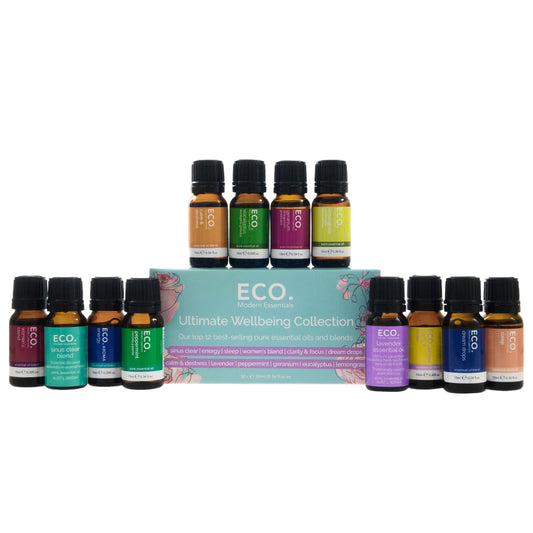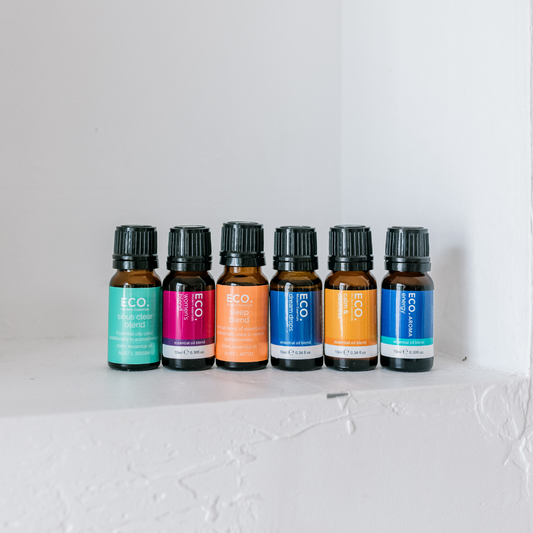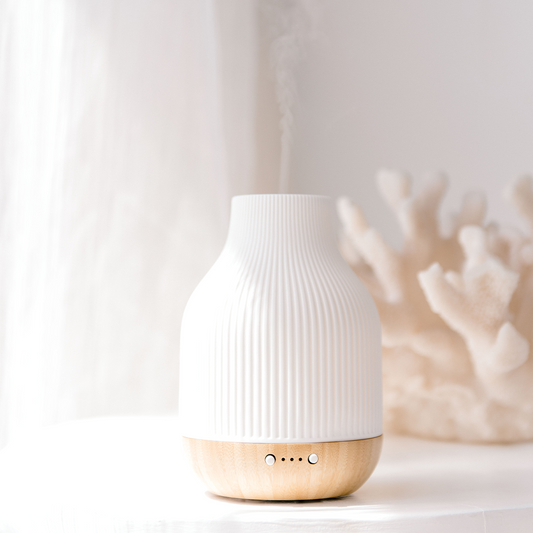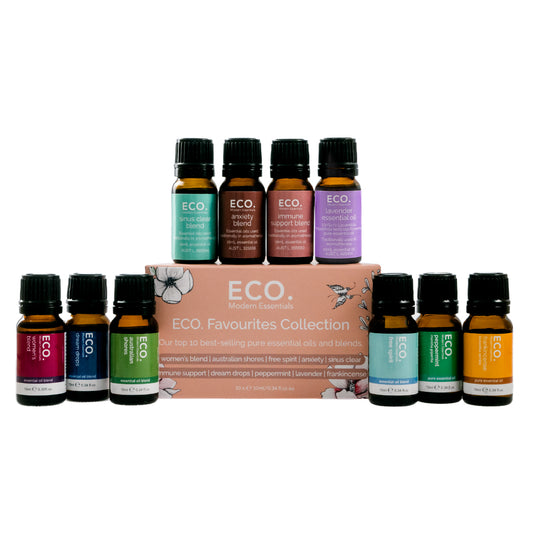Clove comes from the Latin word clavus, or nail, which describes the shape of the clove bud. This spice has long been prized for medicinal, flavouring and preservative uses. The dramatic history of the clove trade is full of fighting, smuggling and the widescale destruction of clove trees at one point. Thankfully, today we can enjoy the powerful healing properties of this essential oil and be reinvigorated by its unique scent.
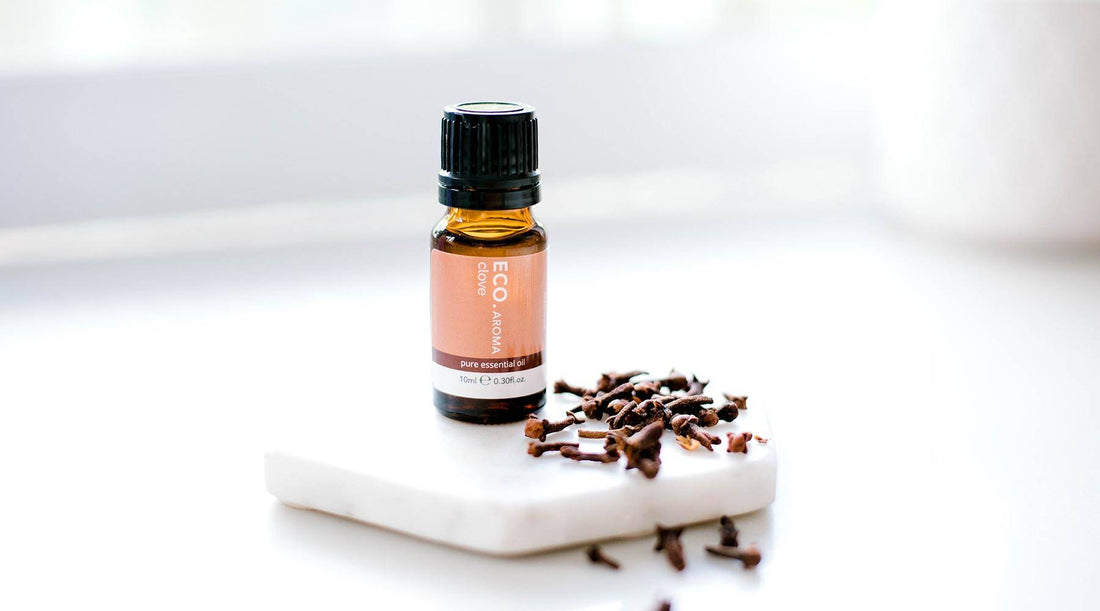
Benefits & Uses of Clove Essential Oil
Clove Essential Oil
Where is Clove essential oil from?
Syzygium aromaticum (Clove) oil originally comes from the Moluccas, also known as the spice islands of Indonesia. Indonesia currently supplies 70-80% of the global clove oil demand.
How is Clove essential oil made?
The major harvest is in the dry season from June to September and the trees can be harvested once they are 6 years old and they reach their maturity at around 15 to 20 years. Clove trees are grown in many regions around the world making year-round harvesting possible. The clove plant will produce its bud every 6 months and the fallen leaves are also collected throughout the year to produce clove leaf oil. Clove bud essential oil can be produced by solvent extraction but is most commonly produced through steam distillation. The cloves are broken down into small fragments before distillation to increase the yield of the essential oil. The process can take up to 24 hours.
What does Clove look like?
The clove tree prefers a humid tropical environment with moderate amounts of rain and can grow to between 7 to 15 meters high. The young flower buds are pale and as they mature, they gradually turn green and then transition to red when they are ready to be harvested. The flowers bloom during wet season and the buds will ripen and be ready for harvest during the dry season.
What does Clove essential oil smell like?
The scent of clove bud essential oil is like no other. It has a dry spice note with slightly medicinal tones and an overall sweetness that is at once familiar and distinctive.
History of Clove
Clove trade has a long history that unfortunately resulted in many conflicts due to the high cost and demand of the spice.
The earliest use of clove was recorded during the Han dynasty in 200 BCE. It was favoured in China as a breath freshener and was an important medicinal and culinary spice. Clove buds later reached India where they were prized for cooking and became invaluable to Ayurvedic medical practitioners. Over the next few centuries cloves were traded throughout Europe. Recorded uses of clove in Europe involve preserving and pickling food. Cloves were used along with other herbs to ward off plague infection and to treat dental conditions. China initially controlled clove trade but over time Portugal then Holland wrestled control from each other. Meanwhile, smugglers eventually brought cloves to the islands of the Indian ocean and to the new world. After the Dutch monopoly was broken the plant flourished in many regions across the globe and the conflict over clove trade subsided.
What are the benefits of Clove essential oil?
Clove bud is an excellent choice for the care of general muscle aches and other soft tissue injuries. The analgesic property can help reduce muscle pain and its anti-inflammatory action is useful to treat arthritis, bursitis, sprains and strains. Bursitis commonly causes pain in the hips and shoulders and is the inflammation of the ‘padding’ or bursa that separate different structures within the body. Clove essential oil may help calm nerve pain such as sciatica and neuralgia too. Clove essential oil is considered a tonic for the stomach and may generally help regulate the digestive system. More specifically, the essential oil can reduce abdominal pain that is caused by intestinal spasming and relieve excess wind due to its calming and antispasmodic action.With well researched anti-fungal, anti-bacterial and anti-viral properties, clove bud makes a versatile addition to cleaning products. Clove bud is often thought to help control mould and could be useful in the bathroom and other areas prone to damp, such as a dark wardrobe.Clove bud is also thought to have immune stimulating properties and may help during illness to fortify the immune system. This immune stimulation may be due to an increase in circulation from the warming action of the essential oil.The warming and dry aroma of clove bud is said to reduce mental fatigue and may improve memory. Our mental processes can be impacted by fatigue, stress, and diet, leaving us feeling cotton-headed and unable to concentrate. Clove has an energising aroma and can be used in the diffuser to reduce drowsiness, apathy, and a lack of motivation.How do you use Clove essential oil?
- Diffuser: Add 6-8 drops of your Clove essential oil to a diffuser.
- Quick fix: A few deep inhalations from the bottle can help when you are at work, in the car or anytime you need a quick break.
- Massage: Use a 2.5% dilution; up to 15 drops per 30ml carrier oil.
- Hand or foot bath: Add 2 drops of essential oil to a bowl of water.
- Compress: To a bowl of water, add 2 drops of essential oil. Agitate a face washer in the water, wring out excess moisture and apply washer to the affected area. Repeat two or three times as the compress cools down or warms up to treat abdominal complaints and muscular pain.
- Cleaning: Can be used in a spray bottle as a disinfectant.
Do not use undiluted on skin. Keep dilution low as Clove Bud can be toxic and overwhelming to the mind in large doses. Also, may cause skin irritation. Care should be taken when blending with clove bud because of its distinct and powerful aroma intensity. Only one or two drops too many and clove can very quickly overpower a blend. Delicate scents such as rose and neroli are easily lost in a cloud clove bud. Clove bud pairs well with other powerful fragrances such as Peppermint, Frankincense, Lavender, Ylang Ylang and Geranium. Other spice essential oils such as cinnamon, ginger and black pepper combine to create a warming and energising blend. To balance out the blend you may like to add a citrus note such as Lemon or Sweet Orange.
Contraindications of Clove essential oil
Clove bud essential oil can cause skin irritation, so it is best to avoid applying if you have sensitive skin. Always dilute clove bud in carrier oil when using on the skin and avoid using on the face. The effects of clove bud are powerful, and it is not suitable to use with young children under 2.






